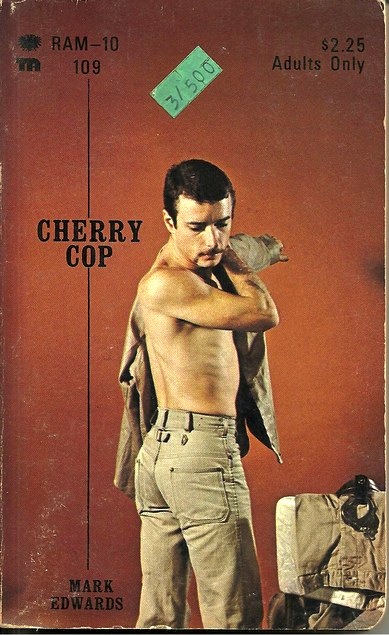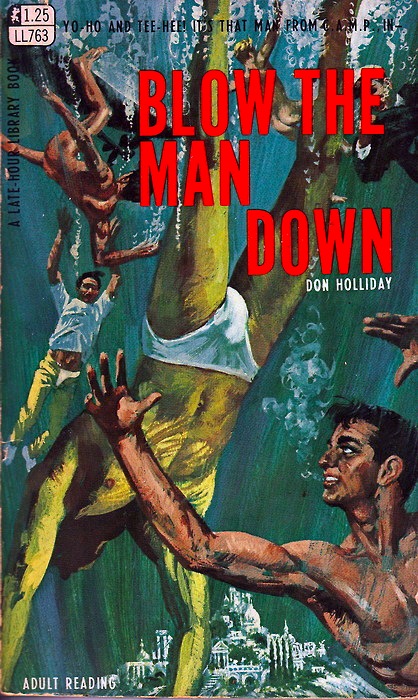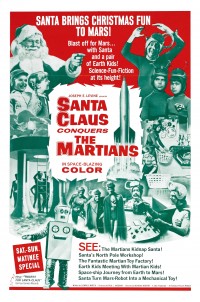Paperback Cover of the Week: Cherry Cop
Cute Couples
Cool Cinema Trash: Butterfly (1982)
 From the author who gave you “The Postman Always Rings Twice”, “Double Indemnity”, “Mildred Pierce”. Now, his most powerful and daring love story comes to the screen!
From the author who gave you “The Postman Always Rings Twice”, “Double Indemnity”, “Mildred Pierce”. Now, his most powerful and daring love story comes to the screen!
Honest and hard-working Jess Tyler (Stacy Keach) arrives home one blistering afternoon to find a pouty sexpot (Pia Zadora) sitting on the front porch of his modest desert shack. “Something you want?” he asks.
“How can I tell, till I know what you got?”
And we’re off and running on the sexed-up rollercoaster ride that is Butterfly (1982) the neo-noir melodrama based on the James M. Cain novel.
What it’s all about: The ‘purty young thing follows Jess around as he goes about his daily chores.
“Don’t it get lonely out here?” the mystery gal asks, “Or is milkin’ that cow good enough for you?” After taking a sip of fresh cream, she licks her lips and purrs, “I like it warm with foam on it.”
With the shameless flirtation out of the way, she finally reveals that she’s Kady… his daughter. “You didn’t think I’d still be a little girl did ya?” No siree, Kady’s all growed up, that much is for certain. She has more news. Jess is a grandfather. After having her baby out of wedlock, she escaped the judgmental stares of her hometown and headed to the desert to reunite with her estranged father.
That night, with a jerry-rigged sheet as a room divider, Jess takes more than a fatherly interest in Kady’s shapely silhouette as she undresses for bed. The next morning he finds her outside near the entrance of the old silver mine, the mine that its Jess’s job to protect. It soon becomes apparent that a family reunion isn’t the only reason for Kady’s visit.
“Is there enough silver in there to make one, maybe two, people rich?” When Jess tells her that indeed there is, she asks the inevitable, “What’s to stop us from tryin’ to get it out?”
Jess won’t even consider her plan until she reveals that the father of her child is Wash Gillespie, the son of the man who owns the mine. “They owe me and my baby! If I take that silver, that’s payment and that’s right and that’s good.”
With all the sincerity of a high school drama student reciting Scarlet O’Hara’s ‘I’ll never go hungry again’ speech, Zadora launches into Kady’s sad tale of growing up in her mother’s boarding house. It may be the best bad movie monologue ever.
“Jess, the first time I ever had a paper dollar bill in my hand I was twelve years old. I let one of the boarders spend the night with me. Maybe that was bad, but the things I bought with that money was good, and I want more for me and my baby. I want good things for him, and if that’s bad… then I wanna be bad!”
Jess’s answer? He drags her to church.
As you might expect, it doesn’t go particularly well when fire and brimstone preacher Stuart Whitman directs his lust and fornication sermon directly towards Kady. She flees and the preacher rather untactfully reminds Jess, “You can only be a daddy to her, nothin’ more.”
Kady arrives home the next morning as unrepentant as ever. At the mere mention of her leaving, Jess agrees to her plan and they head to the mine. After a day of pounding hard rock, Jess prepares a soaking tub for Kady. “Is it gonna be like this everyday?” she asks as she strips down and steps into the water, giving her daddy an eyeful, “Hurtin’ all over and not a thing to show for it? My shoulders feel like somebody’s been mining them.”
She requests a backrub and Jess willingly complies. When things start to heat up, Jess hesitates. “It’s all right if it’s good,” Kady tells him, repeating a mantra that seems to be her answer for just about everything.
“But you’re my daughter Kady.”
“I’m a woman too.”
Much to her dismay, Jess pulls his hand from the soapy water.
They continue to work the mine and find enough silver fragments for a celebratory trip into town. Jess leaves her to do some shopping and comes back later to find her at the local roadhouse in the arms of a randy cowboy. When she decides to leave with not one, but two local boys, Jess does everything he can to protect what little honor Kady has left.
After the ensuing bar fight, Jess and Kady must stand before the local judge on charges of disturbing the peace. Judge Rauch (Orson Wells) takes a shine to jailbait Kady and has her approach the bench for a closer inspection. With a nominal fine and the threat of reform school, Kady and Jess return to the solitude of their desert shack only to find a family reunion (of sorts) in progress.
Kady’s sister has brought Kady’s infant son Danny for a visit. Her baby’s daddy soon comes a callin’ too. Wash Gillespie (Edward Albert) doesn’t have much backbone, but he is awfully rich. Kady plays hard to get at first (“I got one baby suckin’ on me, I don’t need another.”) but quickly accepts his marriage proposal.
Things are going real good until Jess’s tubercular ex-wife Belle (Lois Nettleton) shows up with the man who stole her from Jess years before, Moke Blue (James Franciscus). Nettleton hacks and wheezes with all the subtlety of a silent movie queen and soon takes to her sick bed. As her last dying act she tries to kill Moke with a hatpin, but he’s a slippery snake and escapes with only a flesh wound.
As Belle is laid to rest, Moke’s motives for returning to the desert become clear. Jess finds him toiling in the mine, searching for what’s left of the silver. Jess notices that Moke has a butterfly shaped birthmark that is identical to one that little Danny has. Jess jumps to the conclusion that Moke must have fathered Kady’s baby and blasts him with a shotgun. With his dying breath Moke reveals the truth. Danny has his hereditary birthmark because he’s Moke’s grandson. Kady isn’t Jess’s daughter, she’s Moke’s. Jess drags his rival deep into the mine and leaves him to die.
With the latest information about his complicated family tree, Jess goes into town to visit Wash and his parents (Ed McMahon and June Lockhart). Since he wants her all to himself, Jess lies, telling Wash that Danny’s birthmark is proof that the child belongs to Moke Blue.
Left at the proverbial alter, Kady doesn’t waste any time moping, “I don’t want nothin’ from the Gillespie’s but what I came here for in the first place… the silver.”
Jess is ready to give her everything she wants and more. They can barely keep their hands off of one another as the race up the mountain to the entrance of the mine and finally consummate their desire. Remember, Kady still believes that Jess is her father. She boinks him anyway.
A meddlesome mine scavenger witnesses their copulation and it isn’t long before they’re arrested for incest. At their hearing, Jess asks the judge what would happen if he pleaded guilty. The garrulous judge tells him that he’d immediately go to prison, “save the taxpayers the money and me the time, trouble and spiritual disgust.”
“Then I’m guilty and I forced her,” he declares.
Before he’s carted off to jail, Kady wants her say. “He didn’t do anything to me that I didn’t want to happen.”
On the stand, she tells her tale. “What we did was bound to happen from the first day we met… and when it did… it was good for both of us.” It seems doubtful that testimony of mutual orgasm will get them off the hook, but you can’t blame a gal for trying.
With the threat of jail time for him and reform school for her, Jess finally reveals that they are not father and daughter. Danny’s birthmark is offered as evidence of Kady’s true lineage. The judge asks why he didn’t save everyone the trouble and just tell her in the first place. “Because she never really had a father,” is his wacky explanation.
“I wanted to be everything I could to you,” Jess tells her, “because I love you.”
The case is dismissed.
“You’ll always be my daddy. Always.” Kady tells him on the steps of the courthouse. The wayward lovers sadly part. Kady leaves with Wash, presumably for a less complicated and melodramatic life, and Jess returns to the solitary desert life he once knew.
In conclusion: They say that money can’t buy you love, but apparently, it can buy you a Golden Globe Award. Business mogul Meshulam Riklis, who was Mr. Pia Zadora at the time, not only financed Butterfly, but also paid for the pricy ad campaign that would win his wife the Golden Globe for “Best New Star of the Year”. New star is a bit of a stretch. Though her on screen billing in Butterfly reads: Presenting Pia Zadora as Kady, Zadora made her actual film debut decades earlier in the low-budget Christmas classic, Santa Claus Conquers the Martians (1964). The same year that Zadora won her Golden Globe for Butterfly, she also received the dubious honor of two Razzie Awards, one for Worst Actress and one for Worst New Star.
Sadly, Zadora’s film career would quickly befall the “three strikes” rule. After Butterfly, two more flops followed, Fake-Out (aka Nevada Heat, 1982) and The Lonely Lady (1983). Her career seemed dead. But you can’t keep a good Pia down for long. Zadora found success within the music industry, earning a Grammy nomination in 1984 and singing with Jermaine Jackson on the hit single, “When the Rain Begins to Fall”. She’d later go on to a successful stint in Vegas, opening for Tony Bennett and Frank Sinatra.
The picture and sound quality of the DVD release is quite good, though it should be noted that the grainy/soft-focus look of the film has to more to do with the style in which Butterfly was shot and less with the quality of the DVD. Extras include a trailer, audio commentary by the cast and the documentary Butterfly: The Steamy Saga of a Cult Classic. Director Matt Cimber, producer Riklis, Zadora and Keach all share their memories of the film, including its inception, the filming on location, its premiere at Cannes and the Golden Globe debacle.
Zadora sings Butterfly’s theme song, the appropriately titled, “It’s Wrong For Me To Love You”. Well, if lovin’ Pia Zadora’s deliciously bad movies is wrong… then I don’t wanna be right.
Paperback Cover of the Week: Blow the Man Down
Cute Couples
Cool Cinema Trash: Santa Claus Conquers the Martians (1964)
Santa brings Christmas fun to Mars!
Kiddie matinees were a weekend mainstay in many small town movie theatres from the early 50’s until the mid 70’s. Mom could drop the kids off at the picture show while she ran errands and did the shopping. These matinees were often filled with second run family films, animated classics (mainly Disney) and low-budget fare. The holiday film Santa Claus Conquers the Martians (1964) definitely belongs in the latter category. It was produced specifically with the kiddie matinee and television market in mind.
What it’s all about: After the bouncy theme “Hooray for Santy Claus” (featuring a children’s chorus that sounds like it was on loan from Peter Pan records) we go straight to a pre-holiday news broadcast from KID TV. The on-the-spot reporter makes a few lame North Pole jokes before a live interview with Santa Claus (John Call). The Big S is as jolly as you might expect, though the frenzied pace of the holiday season has left him so scatterbrained that he refers to one of his reindeer as “Nixon.”
On the planet Mars, Kimar (Leonard Hicks) worries that his children are spending too much time in front of the video set. Bomar (Chris Month) and Girmar (Pia Zadora) placidly watch earth programs. They won’t eat and they won’t sleep. “Something is happening to the children of Mars.”
In a smoky Martian forest where the alien trees are made of two by fours draped with synthetic angel hair, Kimar and members of the counsel consult Chochem (Carl Don). The ancient one appears in a magical puff of smoke and proclaims that Martian kids are just too serious. “They must learn what it means to have fun,” he croaks, “We need a Santa Claus on Mars.”
“Desperate problems require desperate deeds,” declares Kimar, “Earth has had Santa Claus long enough.” Kimar and his crew blast off in their rocket ship but are confused when they find a Santa Claus on nearly every earth street corner. “With so many, they won’t miss one.”
Voldar (Vincent Beck) the mustachioed Martian antagonist gripes, “All this trouble over a fat little man in a red suit.”
When the Martians land, they encounter young Billy (Victor Stiles) and Betty (Donna Conforti). “What are those funny things sticking out of your head?” precocious Betty asks.
“Those are our antennae.”
“Are you a television set?”
Precocious it seems, but not too bright.
Voldar calls them nincompoops before dragging them along to the North Pole. When the children hear of the Martian’s kidnapping plot, they make a quick getaway in hopes of warning St. Nick. A guy in a shabby polar bear costume briefly menaces them before Torg the futuristic robot (played by a guy in an even shabbier cardboard robot costume) captures them. Billy and Betty are taken back to the spaceship while the Martians use Torg to raid Santa’s workshop.
The oversized toy doesn’t threaten Santa, though after a close inspection he declares that Torg is “very well-made”. Voldar uses his Wham-o air blaster to freeze Santa’s helpers. “We don’t want to hurt you Santa, so come along quietly.”
The kidnapping of a seasonal icon makes international news on earth. Voldar can’t stand that the jolly old elf handles his abduction with such a cheery disposition. After some expositional dialog that clearly spells out the jeopardy they’ll soon face, Voldar places Santa, Billy and Betty into the ship’s air lock and blasts them into space.
An embarrassingly hokey fistfight ensues when Kimar learns of Voldar’s treachery. But he needn’t fear, Santa and the children escape certain death with the help of Santa’s magical yuletide powers.
Kimar brings Santa to his space age Martian home (complete with a tower of crystal fountain by Dawson of N.Y.C.). Santa does a meet and greet with Kimar’s family, “I’m not accustomed to entering people’s homes through the front door, but you have no chimney.” At first Bomar and Girmar eye Santa suspiciously, but the holiday spirit proves to be contagious. They’re soon laughing it up for no apparent reason.
Holed up in a cardboard cave, an excommunicated Voldar plots his revenge along with his dimwitted compatriots. “We cannot eliminate Santa Claus, but we can discredit him.”
Meanwhile, Santa oversees toy production in his high-tech Martian workshop. With the push of a button, toys roll off an assembly line. “That’s automation for you.”
Once Santa has retired for the evening, Voldar and his crew engage in some tepid slapstick before sabotaging the toy machine. When Santa and the children arrive for work the next day, the machine spits out defective toys.
Droppo the Martian (Bill McCutcheon), whose only purpose so far has been to provide annoying comic relief, shows up dressed like Santa. Voldar mistakes him for the real Santa and takes him hostage. Voldar soon realizes that he’s got the wrong earthling and returns to the workshop to get the genuine article. Billy, Betty and the Martian children fight him off with a barrage of toys that they let loose with gusto. Despite the fact that he’s carrying a Wham-o freeze gun, Voldar is easily defeated. The only thing left for everyone to do is have a hearty good-natured laugh.
When Santa sees Droppo in his signature seasonal attire, he declares that, “You don’t need me here. You’ve got a wonderful Santa Claus of your own.” With the Jeudo-Christian holiday tradition firmly established on another planet, Santa’s work is done. “Merry Christmas everyone…Away!” he dramatically declares as if he were making a magical exit. Instead, he just walks out the door.
A reprise of the theme song follows as the rocket ship with Billy, Betty and Santa returns to earth. Once the end credits finish, karaoke lyric appear on the screen so that the young (and the young at heart) can sing along with all the happy children of the world.
S-A-N-T-A C-L-A-U-S. Hoo-ray for Santy Claus!
Indeed.
In conclusion: Santa Claus Conquers the Martians has always maintained a certain level of notoriety among cult film buffs. It experienced a mainstream surge in popularity when it was featured on a memorable episode of Mystery Science Theatre 3000. Aside from the nostalgia it offers to those who spent their holidays in front of the warm glow of a console TV, the movie’s biggest claim to fame is that it marks the film debut of a young Pia Zadora. Who could have guessed that the adorably chubby little girl Martian would grow up to bare it all in the pages of Penthouse and in cult films like The Lonely Lady (1983).
Another charming part of Santa Claus Conquers the Martians is its rock bottom production vales. All of the sets have a two-dimensional feel, as if they were once part of a grade school Christmas pageant. Every scene in the film (including those that take place outdoors) was shot at the Michael Mayerburg Studios in New York. In actuality, the “studio” was a retrofitted aircraft hanger on Long Island. It’s hard not to admire the filmmaker’s can-do attitude.
The original copyright for Santa Claus Conquers the Martians long ago fell into the public domain. Countless companies have distributed it on video and DVD over the years and most of them used the same worn-out source print. The battered nature of Santa Claus Conquers the Martians adds a certain retro appeal, like you’re watching it on the late, late show on a local UHF channel.
But if HD is more your thing, Santa Claus Conquers the Martians made it’s Blu-ray debut in 2013.
Equal parts holiday, family and low-budget sci-fi film, Santa Claus Conquers the Martians has a genre defying charm that can be enjoyed any time of the year.










